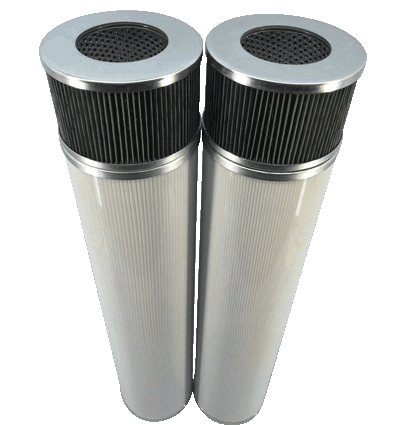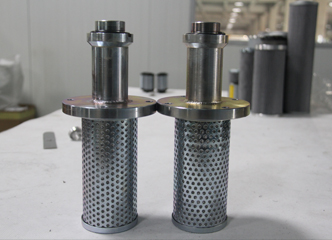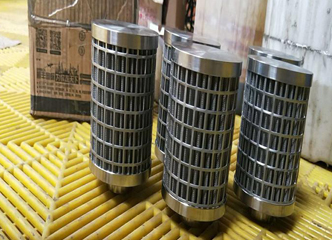In the rapidly evolving industrial landscape, the need for customized and efficient filtration solutions has never been greater. The answer? Non-standard customized filter elements. These remarkable, tailor-made filtration devices offer long service lives, high pollutant capacities, and deep filtration - all while accommodating the unique needs of different industries.
What exactly are these non-standard customized filter elements? Installed in the filters and oil filters of your hydraulic systems, these filter elements remove metal powder and other mechanical impurities. This helps to keep your oil circuit pristine, efficiently prolonging the life of your hydraulic system.

Importantly, the unique selling proposition of these filter elements is customization. They can be tailor-made to fit the specific working conditions and requirements of various industrial sectors. Whether it’s the pharmaceutical industry's need for high sanitation standards, the food industry's demand for stringent purity levels, the electronics industry's demand for absolute precision, or the oil and petrochemical industry's high throughput requirements, these filter elements can be customized to address specific industrial requirements.
Let's delve a little deeper into the features of the non-standard customized filter elements. Made of single or multi-layer metal mesh and filter material, these filter elements can withstand high pressure and ensure perfect straightness. Their distinguishing characteristics include superior concentricity, high pressure bearing, stainless steel composition, and the absence of any burrs, all of which contribute to a significantly extended service life.
Interestingly, the filter elements can be made from different materials such as stainless steel woven mesh, sintered mesh, iron woven mesh, and filter papers including glass fiber filter paper, chemical fiber filter paper, and wood pulp filter paper. The number of layers and the mesh depend on different service conditions and uses, reflecting the great adaptability of these innovative filter solutions.
The non-standard customized filter elements are advantageous for their large filter area, high filtration precision, and internal thread structure. These unique features enable a large filtering area, ensure high precision and enhanced compression resistance, all contributing to increased efficiency for industries. Further enhancing their appeal, these filters showcase wide chemical compatibility, large flux, and low differential pressure. They can be washed, regenerated, and sterilized via a chemical method or in-line steam sterilization, offering long-lasting and economical filtration solutions.
The non-standard customized filter elements also stand out in terms of the structure. Following a sparse outside and dense inside honeycomb structure, they offer high dirt holding capacity, ensuring maximum filtration efficiency.
In conclusion, the non-standard customized filter elements rise as industry game-changers. They bring together superior filtration efficiency, customization according to user needs, long lifespan, and a variety of material choices tailored to diverse industrial requirements. As the world continues to evolve, it's these adaptable, efficient, and high-quality solutions that will lead industries towards a cleaner and more productive future. And it's these non-standard customized filter elements that will be at the heart of this transformation.
The extended service life of non-standard customized filter elements can be attributed to a few distinguishing characteristics:
Material Quality: They are typically constructed with high-quality materials like stainless steel, which is known for its durability, resistance to rust and corrosion. The filter media such as glass fiber, chemical fiber, or wood pulp filter paper also contribute to the durability and efficiency of these filter elements.
Design: The design of these filter elements includes single or multi-layer metal meshes and filter materials, endowing them with a high load-bearing capacity and resistance to high pressure, which ultimately enhances longevity.
Construction: The construction of these filters often involves an internal thread structure, which enhances compression resistance, contributing to their durability.
Honeycomb Structure: The sparse outside and dense inside honeycomb structure significantly increases dirt holding capacity, avoiding frequent blockages and thereby extending service life.
Regeneration Capability: Another important characteristic is their ability to be washed, regenerated, and sterilized by either a chemical method or inline steam sterilization. This feature not only improves the lifespan of the filter elements but also renders them a more cost-effective solution.
Customization: Since these filter elements can be customized per the requirements of the specific industrial application, they are appropriately designed to handle the particular challenges they would face during operation, whether it be specific contaminants, operating pressure, temperature, or flow rate. This right-fit design extends their service life by ensuring they are not over-stressed or under-utilized.
Together, these features result in non-standard customized filter elements that perform efficiently for longer durations, reducing replacement frequencies and maintenance costs down the line.

Non-standard customized filter elements are constructed using robust and durable materials to enhance their longevity and performance. Here are some of the common materials used:
Stainless Steel Woven Mesh: Known for its durability, resistance to rust, high temperature, and corrosion, stainless steel woven mesh is frequently used in these filters. It provides excellent structural stability under various operating conditions.
Sintered Mesh: Sintered mesh is created by fusing multiple layers of metal mesh to form a material with enhanced structural integrity. Its durability, along with its ability to withstand high pressure and temperature, makes it an ideal choice for filter elements.
Iron Woven Mesh: Iron woven mesh, though less resistant to rust compared to stainless steel, offers solid strength and durability, making it suitable for certain applications.
Filter Papers: Filter papers such as glass fiber filter paper, chemical fiber filter paper, and wood pulp filter paper are often used due to their excellent filtration properties and durability. The type of filter paper used is dependent on the specific filtration requirements.
Multi-layer Sintering: Multi-layer sintering involves fusing several layers of filter media together to create a robust and durable material with an enhanced ability to trap particles and resist damage over time.
Threaded Structures: Thread structures made from resilient materials are used to enhance the material's compressive strength, contributing to the overall durability of the filter elements.
Utilization of these durable materials in the construction of non-standard customized filter elements ensures both their prolonged lifespan and reliable filtration performance, even under challenging industry conditions.
The use of stainless steel woven mesh in non-standard customized filter elements significantly enhances their durability due to several reasons:
Corrosion Resistant: Stainless steel boasts excellent resistance to corrosion, a property that makes it perfect for use in a variety of industrial applications. It remains unaffected by exposure to harsh chemicals, high temperatures or moisture, which helps maintain the filter's efficiency over time.
High Strength: Stainless steel woven mesh provides robust structural support, ensuring the filter element can withstand high pressure and significant wear and tear over time without damage.
Temperature Tolerance: Stainless steel can withstand high temperatures without losing its structural integrity. This makes it an invaluable material in industries where filter elements are exposed to extreme temperatures.
Non-reactive: Stainless steel is non-reactive with most substances, which makes it a safe option to use without fear of undesirable chemical reactions that could degrade the filter over time.
Longevity: Due to all these factors, filters made with stainless steel woven mesh exhibit an extended useful life, meaning less frequent replacement is required. This results in greater cost efficiency in the long run.
Easy to Clean: Stainless steel is easy to clean and maintain, which aids in prolonging the life of the filter elements.
In these ways, the use of stainless steel woven mesh in filter elements exceptionally enhances their resilience and longevity, ensuring optimum performance over an extended period.
Stainless steel woven mesh provides critical structural support to filter elements in several ways:
Tensile Strength: Stainless steel has excellent tensile strength, meaning it can withstand significant stress without breaking or deforming. This inherent strength provides solid structural support within the filter element.
Rigidity: Due to its rigid nature, stainless steel woven mesh maintains its shape under pressure, supporting the filtration layers, and preventing them from collapsing or deforming during filtration processes.
High Load Capacity: The woven construction of the mesh creates a structure with a high load capacity. It helps the filter to withstand the physical stresses of industrial operations, contributing to the durability and reliability of the filter elements.
Design Flexibility: The woven mesh can be designed in various weave types (i.e., plain, twill, or Dutch weave) to yield different strength characteristics. It can also be created with different strand thicknesses and mesh sizes, enabling the filter design to be optimized for different pressures and particulate sizes.
Damage Resistance: Stainless steel itself is resistant to cracking, chipping, and wear. These characteristics ensure the structural integrity of the filter elements, even under challenging conditions.
Overall, stainless steel woven mesh plays a critical role in ensuring the structural strength and integrity of non-standard customized filter elements. Its characteristics allow the filter to perform under various stresses and conditions while maintaining its shape and effectiveness.
The rigidity of stainless steel woven mesh plays a vital role in maintaining the shape of filter elements, particularly when under pressure. When a fluid passes through a filter, substantial pressure is often applied to the filter element.
Shape Retention: The rigidity, or stiffness, of stainless steel allows the woven mesh to maintain its form despite these forces. Unlike some materials that may deform or warp when subjected to pressure, stainless steel mesh maintains its shape, ensuring consistent filter performance and pore sizes.
Resistance to Collapse: The structural rigidity of the stainless steel mesh also prevents the filter element from collapsing under the pressure of the incoming fluid. This is especially important when the filter is used in high-pressure applications.
Consistent Filtration: An advantage of this rigidity is the maintenance of consistent pore sizes. Deformation of the filter element can alter these sizes, affecting the quality of filtration. By maintaining its form, the stainless steel woven mesh ensures consistent, reliable filtration regardless of the pressure involved.
Prolonged Lifespan: Lastly, by resisting deformation, the stainless steel woven mesh considerably prolongs the lifespan of the filter elements, reducing the need for regular maintenance or replacement.
By maintaining the shape and integrity of the filter elements under pressure, the rigidity of stainless steel woven mesh contributes to their overall performance, efficiency, and durability.

The rigidity of stainless steel woven mesh considerably contributes to the durability of filter elements in several ways:
Shape Maintenance: As mentioned earlier, rigidity allows the stainless steel mesh to maintain its original shape under pressure. Filters that maintain their shape have a longer service life, avoiding wear and tear that could occur through deformation under pressure.
High Stress Resistance: The rigidity of stainless steel provides a higher resistance to stresses such as compression, tension, torsion, and shear forces. This resistance significantly prolongs the operational life of the filter elements.
Minimal Wear and Tear: A rigid structure reduces the potential for wear and tear because it can handle the constant pressure of the filtration process without deforming. This means the filter can endure extended operation before showing signs of physical decay.
Resistance to Impact: The rigid stainless steel mesh can also withstand sudden impacts and changes in pressure — common in many industrial processes. This characteristic further boosts the filter's durability.
Consistent Filtration Performance: Since a rigid stainless steel mesh maintains its shape and pore size, the performance of the filter remains steady over time. Consistent performance ensures that the filter doesn't become less effective as it ages, thus contributing to its overall longevity.
Overall, the rigidity of stainless steel woven mesh significantly enhances the durability of filter elements, ensuring they can withstand long-term usage and harsh conditions while providing reliable, consistent filtration.








